

The battle of 'resistance' vs 'revolution' in the Middle East. Does Ethiopia's Abiy Ahmed deserve the Nobel Prize for Peace? Ethiopian Prime Minister Abiy Ahmed is due to receive this year's Nobel Prize for Peace at a ceremony in Norway's capital, Oslo.
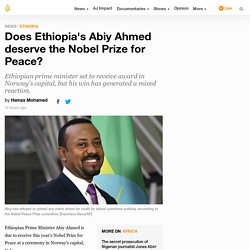
Nato summit: Trump calls Trudeau 'two-faced' over video. Media playback is unsupported on your device US President Donald Trump has called Justin Trudeau "two-faced" over a video in which the Canadian leader appears to mock him at a meeting of Nato leaders.
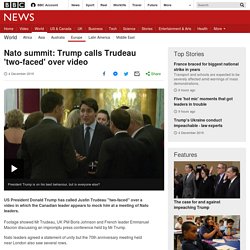
Footage showed Mr Trudeau, UK PM Boris Johnson and French leader Emmanuel Macron discussing an impromptu press conference held by Mr Trump. Nato leaders agreed a statement of unity but the 70th anniversary meeting held near London also saw several rows. Mr Trump cancelled a press conference planned for after the summit.
He told reporters: "We'll go directly back. Troubled Nato not in party mood for 70th birthday. Media playback is unsupported on your device Seventy years of existence is clearly worth celebrating, but Nato is strangely low-key about this week's brief gathering of alliance heads of state and government outside London.
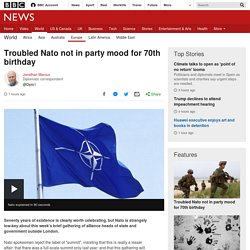
Nato spokesmen reject the label of "summit", insisting that this is really a lesser affair; that there was a full-scale summit only last year; and that this gathering will not release the traditional lengthy communiqué of conclusions and future plans. Why so reticent? This is after all what many Nato advocates call, with some justification, the most successful military alliance in history.
Palestinians need justice before peace. Soon after moving into the White House, US President Donald Trump vowed to do what his predecessors could not: broker a sustainable peace deal between Israel and Palestine.
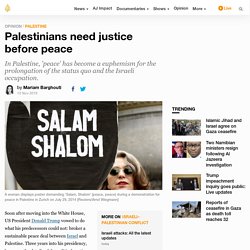
Three years into his presidency, however, the details of the political portion of his so-called "deal of the century" have still not been revealed, and peace remains as elusive for Palestine as ever. Palestinians knew from the get-go that Trump's deal would not bring an end to their colonial reality. They were sceptical not only because the deal was being drafted by a spectacularly inexperienced and staunchly pro-Israel team, but also because in Palestine, "peace" itself is underpinned by a trail of betrayal. Palestinians learned long ago that in the context of the Israeli-Palestinian negotiations, "peace" takes a particularly twisted dimension. It is often associated with "solutions" to the Palestinian "problem" which fail to deliver justice or equality for the Palestinian people.
What Algeria and Sudan Can Learn From Egypt's Revolution. The Roots of Sudan's Upheaval. Saudi Arabia and the UAE belong on the UN 'list of shame' In the coming days, UN Secretary-General Antonio Guterres will finalise his annual list of governments and armed groups that have committed grave violations against children in armed conflict.
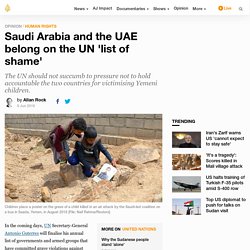
A party can be listed for one or several violations, including rape, killing and maiming, and recruiting children as soldiers. The list is one of the UN's most effective tools for the protection of children in armed conflict, because it involves a consequence that perpetrators dread and seek to avoid: their public naming and shaming before the whole world. The "list of shame" is a powerful mechanism, but its survival depends on its integrity. Why the Sudanese people stand 'alone' In the early hours of June 3 and after five months of protest, the Sudanese security forces moved to break up a protest camp outside the army's headquarters in Khartoum using live ammunition and tear gas.
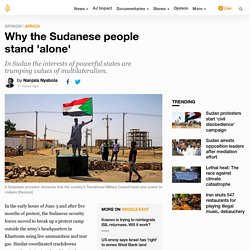
Similar coordinated crackdowns occurred at sit-ins in other cities in the country. According to the Central Committee of Sudanese Doctors, by the end of the operation at least 100 people had been killed, many brutally beaten and injured, and some were raped. The rise and fall of the Isis 'caliphate' The last days.
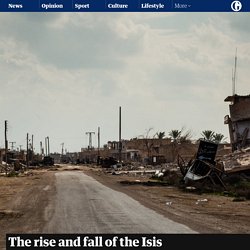
From Christchurch to Colombo, Islamists and the far right are playing a deadly duet. How should we make sense of the Easter Sunday church and hotel bombings in Sri Lanka that killed more than 250 people and wounded 500?
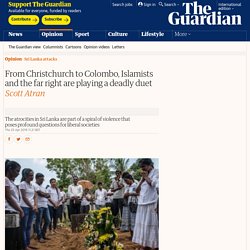
Now that Islamic State appears to have claimed responsibility for the attacks, the question arises: is this merely the latest symptom of an epidemic of Islamist violence, motivated by a belief in offensive jihad (“holy war”)? The answer is complex and not necessarily in line with public perceptions. Islamist terrorism has been decreasing globally, and particularly in the west, since its peak in 2014-15 when Isis established its caliphate. In recent years, however, far-right supremacist terrorism has risen sharply, to more than one-third of terror attacks globally, even accounting for every extremist killing in the US in 2018. These two violent ideologies are not separate, but work in tandem, hammering away at the political order, which is increasingly vulnerable for a number of reasons. The Myth of Climate Wars? by Alaa Murabit & Luca Bücken. Council on Foreign Relations Interactives. Why Sudan needs a slow transition. Although Sudan has witnessed two previous revolutions since independence, it has not had much luck with democratic transitions.
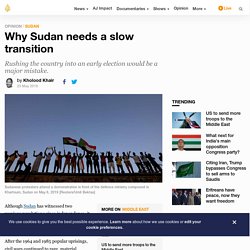
After the 1964 and 1985 popular uprisings, civil wars continued to rage, material changes were not forthcoming for ordinary families, and no robust economic plans were set in motion. Lasting democratic reforms never materialised. In both cases, the revolutionary movements were led by mostly urban, professional elites, dominated by men, and were largely ideologically informed. As a result, neither of these uprisings managed to create a nationwide front that was inclusive of all socioeconomic classes and ethnic and religious groups that could withstand pressure from counter-revolutionary forces and ensure that the major societal divides which fuelled violence were mended. The Eurovision boycott row confirms it: Palestinian lives don’t matter. Eurovision has always been an exercise in bad taste, but this year’s event takes things to an extreme.
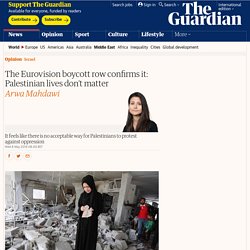
If you want to enjoy the kitschy song contest, which will take place from 14 to 18 May in Tel Aviv, Israel, then you have got to ignore the bloody political context that surrounds it. Indeed, Israel is so intent on keeping Eurovision politics-free that anyone it says might disrupt the event will be blocked from entering the country. One of the most frustrating things about being Palestinian (I’m half-Palestinian myself) is that there seems to be no acceptable way to defend your humanity or protest agains your oppression.
Calls to boycott Eurovision, for example, have been decried as divisive. Look at that language. Opponents of sanctions on South Africa were wrong, but that doesn't mean they always work. I live in Iran. Here's how sanctions have shaped my life. It is 2007, and I am an undergraduate at the University of Tehran. I'm very particular. I take notes with Staedtler Triplus Fineliner pens, in purple and green, and on this particular day I've run through the stash I keep in my desk at home. There is a small office supply store next to the university cafeteria, I've bought my pens there before.
Before lunch I go to pick up some more Fineliners. What Washington's Latest Iran Sanctions Mean and Why They Matter. The U.S. has steadily escalated sanctions on the country since leaving the nuclear deal. Most recently, the U.S. took the controversial step of designating the Islamic Revolutionary Guard Corps, the most important national-security institution in the country, a Foreign Terrorist Organization—an unprecedented step previous administrations considered but never took, and the first time the U.S. has given that designation to a state institution.
Typically, “terrorists” are considered nonstate actors. How will Iran react? So far Iran has reacted mainly with bluster and not much else. Technology is terrorism’s most effective ally. It delivers a global audience. Terrorism is effective because it always seems near. It always seems new. And it always seems personal. Ever since the first wave of terrorist violence broke across the newly industrialised cities of the west in the late 19th century this has been true. Abiy's year one: Ethiopia faces the threat of ethnic conflict. On April 2 last year, Abiy Ahmed took over the premiership of a country on the brink of a major catastrophe. Three years of incessant protests across the restive regions of Oromia and Amhara, increasing ethnic violence and a deteriorating economy had brought Ethiopia to the verge of collapse. The ascendance to power of a young, reformist leader, who was delivering a message of unity, prosperity, justice and peace, gave Ethiopians from all walks of life reason to become optimistic about the future.
For a while it seemed like the new prime minister, the youngest to hold high office in Africa in recent memory, was living up to the people's expectations and more. Political prisoners were released, a landmark peace deal was signed with Eritrea, important political and economic reforms were put in place, and corrupt officials and human rights abusers were punished. However, a year into Abiy's first term, public trust in the government seems to be in decline. I fought South African apartheid. I see the same brutal policies in Israel. Kofi Annan, the Peacemaker Who Knew How to Play Big-Power Politics. Ethiopian governor warns against renewed conflict along Eritrean border – African Daily Voice.
Addis Ababa, Ethiopia (ADV) – The air still panicky in Ethiopia’s northern Tigray region over successful attempts by youths who blocked several military trucks from demobilizing from the border with Eritrea. Somalia: The Forgotten Story. Scroll to watch Part 2. Can We Wage a Just Drone War? A moral case against the war in Afghanistan. Afghanistan War Is Not a Just War. Costas Douzinas: Deconstructing rights: Are wars ever just? » No Just War in Southern Lebanon. Gaza: Is Israel fighting a just war? “If Israel were to abandon the aim of controlling territories to which it has no right, those who fire rockets into Israel would lose what sway they have.” ©Israel Defense Forces. Untitled. The Jus Post - Bellum Framework. Making war illegal changed the world. But it’s becoming too easy to break the law.
Last Thursday at 2.42am, four Israeli jets fired a volley of missiles at a Syrian government facility, destroying buildings believed to be associated with the production of chemical weapons, killing two Syrians on the ground in the process. Costas Douzinas: Deconstructing rights: Are wars ever just? If we can have just war, why not just terrorism? Darfur and the Genocide Debate. Or a Just War? Was Iraq a just war? Depends when you ask. Council on Foreign Relations Just and Unjust War in the 21st Century. Afghanistan’s Next Chapter by Dhruva Jaishankar. Afghanistan’s Forgotten Half by Anne-Marie Slaughter & Ashley Jackson. The principles of mediation and the role of third parties in peace processes. SevenDeadlySinsofMediation BrahimiAhmed2008. Using Carrots to Bring Peace? Negotiation and Third Party Involvement - Institute for Security and Development Policy. Peace Processes in Colombia: International Third-Party Interventions - GCSP.
Dilemmas of third-party involvement in peace processes: Reflections for practice and policy from Colombia and the Philippines. India’s abuse of women is the biggest human rights violation on Earth. 'Into the home and into the mind,' structural violence in occupation - The Tufts Daily. Dialogue9 darweish comm. Diplomats strive to forge peace in Afghanistan, Yemen. Israel-Palestine: the real reason there’s still no peace. It's now clear: the Oslo peace accords were wrecked by Netanyahu's bad faith. Shifts in the Middle East Balance of Power: An Historical Perspective. Simulating War and Peace in IR Theory with a Classroom Game.
The future of international justice. Romeo and Juliet in Kigali. The Balance of Power: a Cause of War, a Condition of Peace, or Both? Why is the world at war? How does Northern Ireland measure up to the Pillars of Positive Peace? #GlobalPeace18 – Slugger O'Toole. After June Ceasefire, Hopes Rise for Afghanistan Peace.
The Real Story - What Does it Take to Make Peace? - BBC Sounds. Colombia election: Farc fails to win support in first national vote. A news and information website on justice and reconciliation processes - JusticeInfo.net. Spies—Not Talks—Brought Peace to Northern Ireland. Reports Archive – Vision of Humanity. Thinking Positive Peace in Syria? – Political Arenas. Mary Kaldor on New and Old Wars.